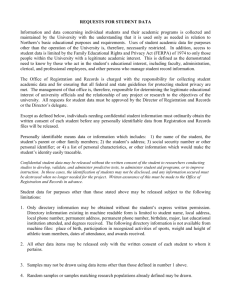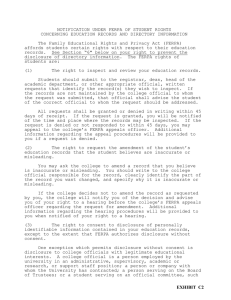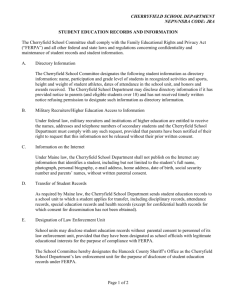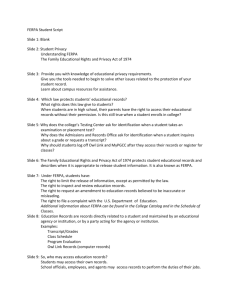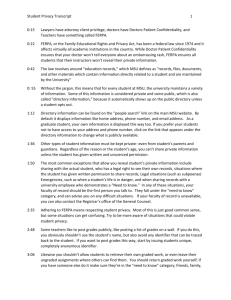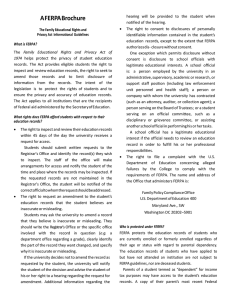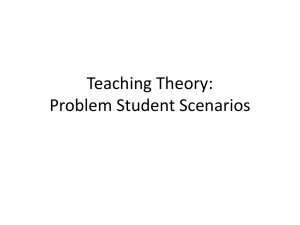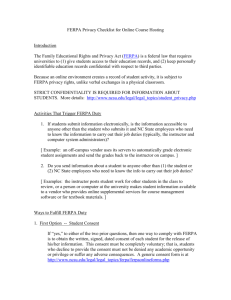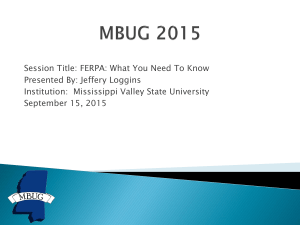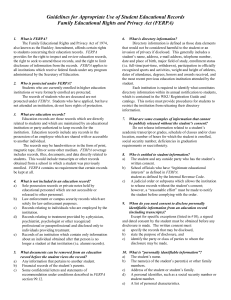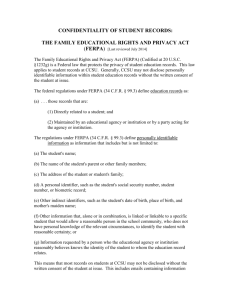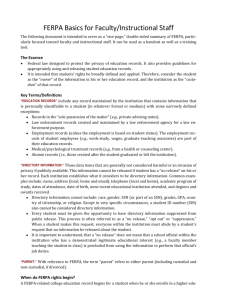FERPA: What does it mean for me? (PDF)
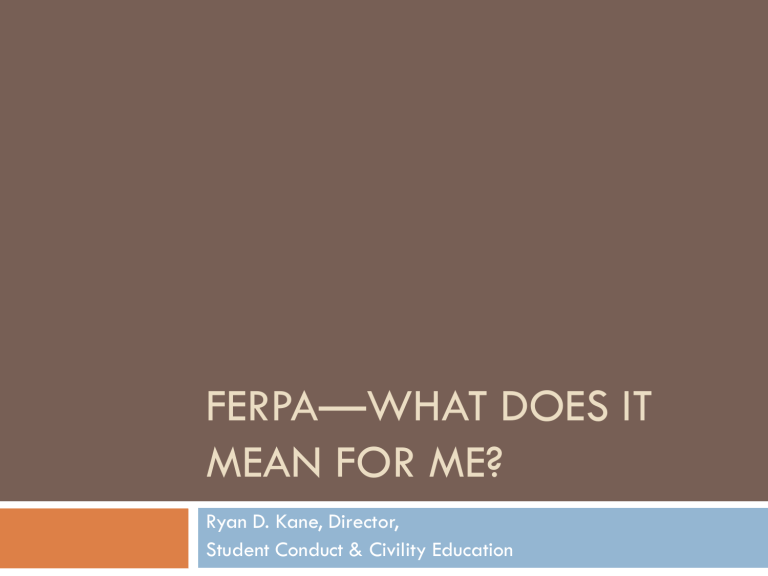
FERPA—WHAT DOES IT
MEAN FOR ME?
Ryan D. Kane, Director,
Student Conduct & Civility Education
Learning Objectives for this session
By the end of this session, participants will be able to:
Accurately describe what an educational record is and is not.
List examples of directory information and how this information can be shared with third parties.
Successfully illustrate real-world examples of how
FERPA applies to them.
What does FERPA stand for?
A: Family Education Rights for Parents Act
B: Federal Educational Right to Privacy Act
C: Family Educational Rights & Privacy Act
C: Family Educational Rights & Privacy Act (1974).
This is a law that protects the privacy of student education records. The law applies to all schools receiving funds from the US Dept. of Education.
Why is this law in existence?
Students at institutions of higher education have rights to know what is in their record.
Students have a right to confidentiality in so much as their records cannot be shared with third parties without their consent (there are notable exceptions which we will discuss).
What rights does FERPA afford to students?
Inspect & review student educational records maintained by the institution.
Request that a school correct a record that the student suggests is inaccurate.
If the institution does not alter the record, the student has a right for a review hearing.
If the review hearing does not alter the record, the student has a right to place a statement in his/her record indicating his/her perspective about the record.
Right to privacy about disclosure of records
Educational records are:
Directly related to a student
Maintained by an educational agency or institution or by a third party acting on behalf of the institution
Defining Educational Records
Educational records include
Written documents, digital files, databases, etc.
Student grades/transcripts
Student disciplinary records
Student involvement transcripts
Academic advising folders
Directory Information
Employment records if position is contingent on being a student
Educational records do not include
Personal notes kept by faculty, or staff
Police records
Health Center records
Counseling Center records
Information obtained when student is no longer a student i.e. alumni records
Personal observations
Directory Information @ TU
Student Name
Address
Telephone number(s)
Date & country of birth
Country of citizenship
Major field of study
Dates of attendance
Degrees & awards received
Most recent previous educational institution attended
Class standing
Participation in officially recognized activities and sports
Weight & height of members of athletic teams
Directory information can be released to a 3 rd party
Students can request non-disclosure on a one time basis to the Registrar’s Office
Student inspection & review of records
Students have the right to inspect & review their own records. This can be done at the department level or at the university level
The Registrar’s Office is the office designated to coordinate the inspection & review of a student’s educational records.
However, your office can disclose
APPROPRIATE records to a student upon request.
Disclosure of records to 3
rd
parties
Keep in mind—FERPA ALLOWS for release of records to 3 rd parties under certain conditions. It does not REQUIRE you to release records.
What are parental rights?
For elementary & secondary education, FERPA gives certain rights to parents regarding their children’s educational records.
These rights transfer to the student upon reaching
18 years of age OR attending any school beyond the secondary level.
This means that even a 17 year old student at TU is the
“owner” of his/her records and the record cannot be disclosed without student consent.
When may a parent access records?
The law allows universities to grant parental access if a student is claimed as a dependent for Federal
Income Tax purposes.
The Registrar’s Office will determine this status for the university.
Access is granted to both the parent who claims the student as well as the parent who is not claiming the student.
Who can access the record without student consent?
School employees with a
“legitimate educational interest.”
Parents who claim their student as a dependent.
Individuals who have obtained a judicial order or subpoena.
Parents/guardians of under 21 y/o students who have violated the alcohol or drug policy.
Appropriate parties who need to know in cases of health & safety emergencies to protect the health& safety of the student and/or others.
Victim of a crime of violence: the results of a disciplinary proceeding w/ respect to the crime.
What constitutes student consent?
Student consent should ALWAYS be written and include a student signature.
If a student is present w/ a 3 rd party i.e. parent, and gives you verbal permission to share information, this can be done. But, this consent does not extend beyond that specific encounter.
Consent should be specific as to who can disclose the information, to whom it can be disclosed, and what information can be disclosed.
Students should be reminded that this is voluntary & the student can change his/her mind at any time.
You should ALWAYS keep a record of the disclosure as part of the student record.
2 Basic Steps to comply with FERPA
1. Notify current students annual in writing of their rights under FERPA.
2 Basic Steps to comply with FERPA
2. Grant access by students, if applicable, to educational records.
Students & former students have the right to inspect their educational records through established procedures within a maximum of 45 days after written request is received. Also have a right to inspect requests for disclosure.
Institution is not required to provide a copy unless failure to do so would deny access.
Records cannot be destroyed if request is pending
Fee can be charged unless cost prohibits access
A few parting comments
When in doubt, protect the confidentiality of a student & then ask for clarification.
The Registrar’s Office will determine dependency status.
Remember, FERPA permits but does not require disclosure to 3 rd parties.
FERPA does not prevent us from talking with a 3 rd party about processes & procedures in general or from talking at all to parents.
Some real life examples…
Important Resources/References
Office of the Registrar (410) 704-2096
University Counsel (410) 704-4008
Student Conduct & Civility Education
(410) 704-2057
Department of Education
FERPA@ED.Gov
http://www.ed.gov/policy/gen/guid/fpco/index.html
